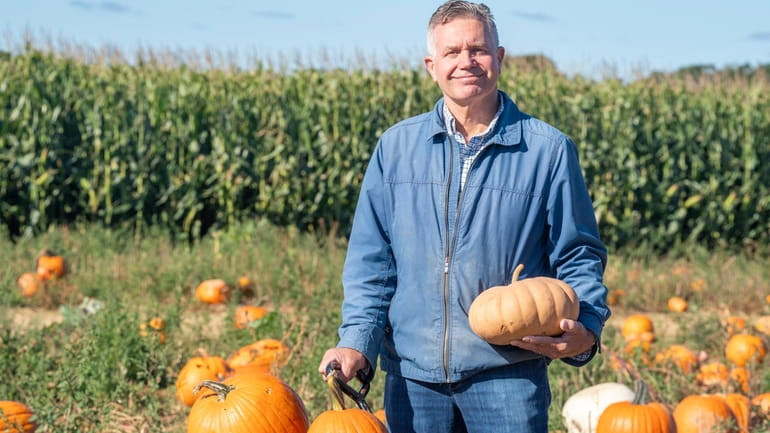Halloween is peak pumpkin-picking time at Long Island's Harbes Family Farm

Edward Walter Harbes III, owner of Harbes Family Farm in Mattituck, at one of the family's pumpkin fields, on Oct. 13. Credit: Randee Daddona
At Harbes Family Farm, 'tis the season for pumpkins.
To meet the demand, the concern annually produces more than 180,000 pumpkins on 60 acres, spread across its properties in Mattituck, Jamesport and Riverhead.
“Forty-five years ago, we just had two acres of pumpkin patches in addition to our main potato business. Now, the wholesale potato business has disappeared from our area for the most part, and you-pick-pumpkins, as well as apples, have together assumed the dominant part of our business,” said Edward Walter Harbes III, 66, the owner and general manager emeritus of the sixth-generation, family-founded-and-operated Harbes Family Farm.
The farm's roots date back to the early 1800s, when Gerard Harbes, a German immigrant, settled in Plainview to plant pickles, cabbage, potatoes and other vegetables.
Harbes Family Farm
General manager emeritus: Edward Walter Harbes III, owner
Locations: Mattituck, Jamesport, Riverhead
Established: 1840
Employees: 20 full time, 300-plus seasonal
Annual pumpkin production:180,000-plus
Proportion of business generated in fall: 85%
Evaporating profit margins drove Harbes Family Farm to quit potato farming in 1989. Today, a local farmer provides the spuds for Harbes farm stands, while the family cultivates other crops, including corn, tomatoes, a vineyard for its own varietals and a large variety of apples and pumpkins.
Its Halloween-centric produce spans from miniature whites and wartys to huge Cinderellas and Prize Winners. Based on a pumpkin’s weight and size, the prices range from $1 to more than $10, according to Harbes.
“In order to have supply, we have to overproduce, and that surplus we wholesale out locally,” said Harbes.
The farm has also sown seeds in the agritourism sector. Its Mattituck property is home to a wine-tasting facility; the eight-acre Harbes Barnyard Adventure, whose attractions include farm animals, singing hayrides, a sports zone, playgrounds and a maze; and a bunny village with live rabbits and Lilliputian bunny stores such as a barbershop and an ice cream parlor
The company generates 85% of its business in the fall, Harbes said.
Although Harbes described his teenage self “as a little challenging to work with,” he began applying himself and joined the family concern in 1978 after meeting his wife, Monica, at Suffolk County Community College in Selden.
“I found someone I wanted to provide a home and place to live, which gave me motivation,” said Harbes. They have four adult sons, four adult daughters and eight grandchildren.
In 1986, Harbes succeeded his father as general manager. But seven years ago, after growing the business, he retired for health reasons and handed leadership to his son, Edward Walter Harbes IV, now 40.
“It’s disruptive for any business when a senior manager gets sick and especially a small business,” said Harbes. “Fortunately, I have family members who have been involved and trained and familiar with the business and were able to pick up the loose ends.”
Harbes recently spoke to Newsday about the business. The answers have been edited for space:
Why did you introduce pick-your-own pumpkins?
In 1990, the pumpkin field happened to be within sight of the farmstand, and some customers would ask if they could pick their own. I said there were pumpkins on the farmstand which they could pick and make their lives easier, but it wasn’t the best answer. After saying no for 10 times or more, [I realized] that people don’t want just the pumpkin but the pumpkin-picking experience. No one takes a picture of themselves at Costco picking up their own pumpkin.
What prompted you to expand beyond farming?
Our family was trending upwards in size and expenses, clothes were costing more and their interests were more expensive — and they wanted to go to college.
Why agritourism?
With families traveling an hour each way [to Harbes farms], there was a poor ratio of effort to reward. So [I thought], what else can we do for them to enjoy themselves? We heard about corn mazes, so we cut out a labyrinth for them to spend an extra half hour on the farm, and then added hayrides.
And we also found out that people want to eat something. So instead of telling them to enjoy roasted corn tonight when they get home, we bought a roasting machine, and they can have it right now with salt and pepper and, if they like, we can dip the corn into hot butter.
Your reason for segueing into wine?
Twenty years ago, I was trying to think of ways to make a family business more appealing to my sons and daughters for their careers. I thought if I told them we’re raising string beans, there’d be much less enthusiasm or buy-in, but a vineyard with our line of wines would be much more likely to get their attention.
No Christmas trees to sell?
I thought about it 15 years ago, but the family said, "Dad, we need a little family time, too."
What challenges does the business face today?
One of our biggest challenges is to remain in the goodwill of the community despite the traffic concerns.
In general, to what do you attribute the firm’s success?
Even though we do our best, we always depend on God’s blessings for our good weather, health and conditions to succeed.
What’s your hope for the future?
This business was developed from its inception to provide for my wife and potential family — and I hope the business has enough vitality for whatever family members want to remain in the foreseeable future.
Since stepping down as general manager, what have you been up to?
I help with public relations and general consulting in the business, but my son is the active general manager. I appreciate whatever remaining time God gives me and would like to make a difference in friendship-based Christian ministries in our community.
